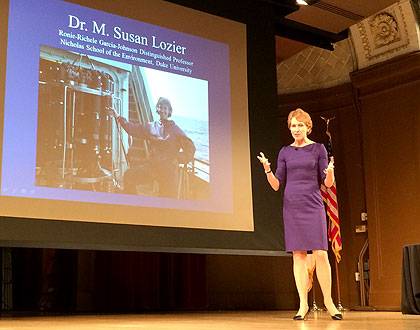
A decade ago, oceanographer Susan Lozier would have said with some confidence that scientists knew ‘a lot’ about the ocean’s circulation, a key component of the global climate system.
After all, the models oceanographers used 200 years of measurements to map the surface ocean currents that, like conveyor belts, carry heat outward from the Earth’s equator to the poles and the deep ocean currents that carry cooler waters back toward the equator.
But in the last 10 years, as teams of researchers have begun using new measurement tools, such as subsurface floats, these assumptions have been largely deconstructed, said Lozier during the Roger Revelle Commemorative Lecture Wednesday at the Smithsonian Institute’s Museum of Natural History in Washington, D.C.
Lozier, the Ronie-Richele Garcia-Johnson Professor of Ocean Sciences at the Nicholas School of the Environment, has been at the forefront of this research. Her work has used dynamic measurement to better capture how human activity is affecting the earth’s oceans – and how those effects can be indicators of global climate change.
Lozier is the international lead for the Overturning in the Subpolar North Atlantic Program (OSNAP) ocean observing system, a collaboration among six countries designed to provide continuous measurements of surface-to-bottom water temperature, salinity and velocities in areas of the subpolar ocean that historically have been under-sampled. At the same time, the OSNAP array will give oceanographers a chance to study how overturning changes affect the environment.
Hosted annually by the Ocean Studies Board of the National Research Council, the Revelle Lecture presents talks that connect ocean science to public policy. Lozier was selected to give the talk because of the topic was “relevant to the concerns of the scientific community,” said Bob Duce, the chair of the Ocean Studies Board.
“Not only is Lozier an outstanding scientist, she’s a tremendous communicator," Duce said. "She can get ideas across to even a non-science community in a wonderful way.”